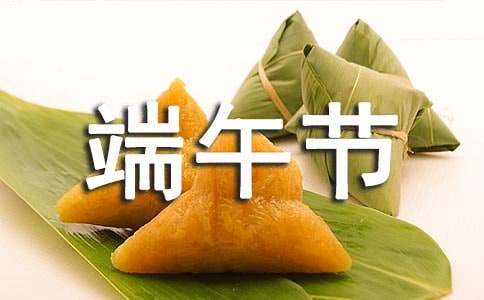端午節(jié)的慶祝活動(dòng)英語
端午節(jié),門插艾,香滿堂,吃粽子,灑白酒,龍舟下水喜洋洋。這些,都是曾經(jīng)端午節(jié)上最熱鬧的活動(dòng),下文是為大家精選的端午節(jié)的慶祝活動(dòng)英語,歡迎大家閱讀欣賞。

端午節(jié)的慶祝活動(dòng)英語【1】
Duanwu Festival (端午節(jié), Duānwū Jié) is a traditional Chinese festival held on the fifth day of the fifth month of the Chinese calendar. It is also known as the Double Fifth.[citation(引用;引證) needed] It has since been celebrated, in various ways, in other parts of East Asia as well. In the West, it's commonly known as Dragon Boat Festival.
The exact origins of Duan Wu are unclear, but one traditional view holds that the festival memorializes the Chinese poet Qu Yuan (c. 340 BC-278 BC) of the Warring States Period. He committed suicide by drowning himself in a river because he was disgusted by the corruption of the Chu government. The local people, knowing him to be a good man, decided to throw food into the river to feed the fish so they would not eat Qu's body. They also sat on long, narrow paddle boats called dragon boats, and tried to scare the fish away by the thundering sound of drums aboard the boat and the fierce looking carved dragon head on the boat's prow(船頭).
In the early years of the Chinese Republic, Duan Wu was also celebrated as "Poets' Day," due to Qu Yuan's status as China's first poet of personal renown(名聲名望).
Today, people eat bamboo-wrapped steamed glutinous(粘的) rice dumplings called zongzi (the food originally intended to feed the fish) and race dragon boats in memory of Qu's dramatic death.
端午節(jié)的慶祝活動(dòng)英語【2】
The Dragon Boat Festival also called the Duanwu Festival is celebrated on the fifth day of the fifth month according to the Chinese calendar. For thousands of years the festival has been marked by eating zong zi (glutinous rice(糯米)wrapped to form a pyramid using bamboo or reed leaves) and racing dragon boats.
端午節(jié),又稱為端午節(jié),是慶祝中國農(nóng)歷的第五個(gè)月的第五天。千百年來,這個(gè)節(jié)日當(dāng)天的標(biāo)志就是吃粽子(用竹葉或者蘆葦葉把糯米包裹形成一個(gè)金字塔形狀)和賽龍舟。
My mother want to teach me how to Pack the Zongzi giving me some meat rice and leaves. The process is so complicated that I only want to sum as tying them first and boiling them in the boiler then.
我媽媽想教我怎樣包粽子,她給了我一些肉,米飯和葉。這個(gè)過程是如此復(fù)雜,所以我只想先把他們都加在一起然后綁起來放到鍋爐里煮沸。
端午節(jié)的慶祝活動(dòng)英語【3】
端午節(jié)也有一種特殊食品。
There is a special food for the festival.
端午節(jié)龍舟競(jìng)賽現(xiàn)已發(fā)展成為國際性的體育項(xiàng)目。
The dragon boat has now evolved into an international sports event.
我喜歡在端午節(jié)喝點(diǎn)雄黃酒。
I enjoy drinking realgar wine during the festival.
端午節(jié)吃粽子,在魏晉時(shí)代已經(jīng)很盛行。
His ability and fight against corruption antagonized other court officials.
人們會(huì)以賽龍舟的比賽活動(dòng)來慶祝端午節(jié),參賽小組劃著龍舟朝著鼓聲前進(jìn),最終達(dá)到終點(diǎn)。
Competing teams row their boats forward to a drumbeat racing to reach the finish end first.
每到端午節(jié),這里都會(huì)舉行飛舟競(jìng)渡的`劃龍船比賽。
Boating competitions are held here during every Dragon Boat Festival.
端午節(jié)是紀(jì)念中國詩人屈原的節(jié)日。
The Dragon Boat Festival is in memory of a Chinese poet, Qu Yuan.
在端午節(jié),我們會(huì)吃一些傳統(tǒng)的食物。
We eat the Dragon Boat Festival.
謝謝你告訴我有關(guān)端午節(jié)的情況。
Thank you for telling me about Dragon Boat Festival.
端午節(jié)的慶祝活動(dòng)英語【4】
A very popular dish during the Dragon Boat festival is tzung tzu.This tasty dish consists of rice dumplings with meatpeanutegg yolkor other fillings wrapped in bamboo leaves.The tradition of tzung tzu is meant to remind us of the village fishermen scattering rice across the water of the Mi Low river in order to appease the river dragons so that they would not devour Chu Yuan.
Zongzi is a pyramid-shaped dumpling made of glutinous rice and wrapped in bamboo or reed leaves to give it a special flavor.Its taste varies greatly across China.Zongzi is often made of rice mixed with dates in Northern Chinabecause dates are abundant in the area.Eastern China's Jiaxing County is famous for its pork-stuffed Zongzi.
In the southern province of Guangdongpeople stuff Zongzi with porkhamchestnuts and other ingredientsmaking them very rich in flavor.In Sichuan provinceZongzi is usually served with a sugar dressing.Most people still maintain the tradition of eating Zongzi on the day of the Duanwu Festival.But the special delicacy has become so popular that you can now buy it all the year round.
【端午節(jié)的慶祝活動(dòng)英語】相關(guān)文章:
慶祝元旦佳節(jié)的活動(dòng)總結(jié)12-02
慶祝圣誕活動(dòng)策劃方案01-15
小學(xué)元旦慶祝活動(dòng)總結(jié)12-23
慶祝春節(jié)的英語手抄報(bào)01-19
學(xué)校慶祝元旦優(yōu)秀的活動(dòng)總結(jié)12-02
元旦慶祝活動(dòng)主持稿12-23
2017小學(xué)六一慶祝活動(dòng)方案08-08
端午節(jié)的由來英語08-08